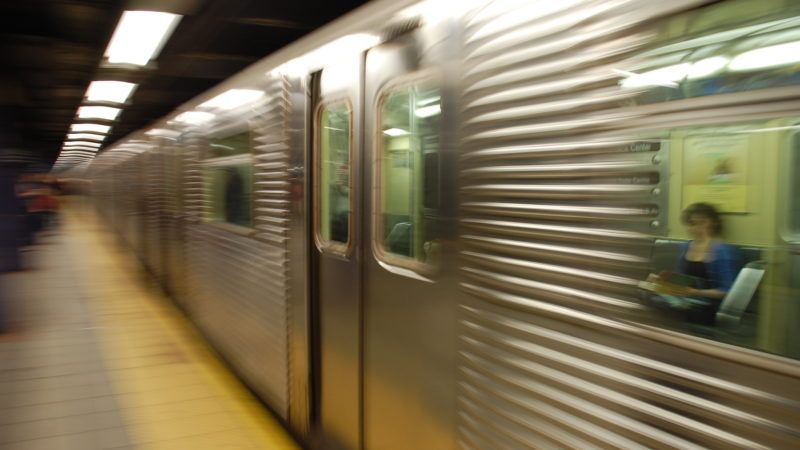Public Transit Advocates Ask for $12.8 Billion Bailout To Cope With 75 Percent Revenue Drop Related to Coronavirus
Public transit was already in decline before the COVID-19 outbreak. Now transit agencies are teetering on the brink of collapse.

Industry after industry is staring into the abyss due to coronavirus-induced shutdowns. That's particularly true of the public transportation sector, which is asking the federal government for a multi-billion dollar bailout in the face of cratering ridership.
On Tuesday, the American Public Transportation Association (APTA)—which represents the nation's transit agencies—asked Congress for $12.8 billion in emergency funding for this fiscal year to deal with the added costs of COVID-19.
"These funds are necessary to maintain essential services, including providing public transportation to health care workers, Medicaid recipients who receive non-emergency medical transportation, and law enforcement personnel," APTA wrote in a press release. "Without these emergency funds, public transit agencies may be required to suspend services."
The entire Federal Transit Administration's budget was $13.4 billion in Fiscal Year 2019.
The group estimates that 98 percent of transit agencies have seen their operating costs increase thanks to the necessary cleanings of vehicles and facilities to prevent the spread of COVID-19. The costs of these cleanups are estimated to be $1.75 billion.
In addition, APTA estimates agencies are experiencing another $6 billion loss due to a 75 percent decline in farebox revenue. That's in addition to $4.8 billion in lost dedicated sales tax revenues.
Randal O'Toole, a transportation expert at the Cato Institute, has said that a mix of pension obligations, rideshare services, low oil prices, and growing maintenance costs would serve as the "four horsemen of the transit apocalypse." He can now add pestilence to the list.
The story APTA reports at the national level is mirrored at the regional and state level.
New York's Metropolitan Transportation Authority (MTA), which runs rail and bus service in the New York City metro area, has experienced a 60 percent decline in subway ridership and a 49 percent decline in bus ridership, according to a letter from MTA CEO Patrick Foye to New York's congressional delegation asking for $4 billion in federal aid.
"The stark reality is that as more people stay home following the advice of medical experts, the MTA is now facing financial calamity," Foye wrote. "We are asking Congress to step up again and deliver for the system that is the lifeblood of New York City and the engine of the region's economic future."
The Washington Metropolitan Area Transportation Authority (WMATA), which runs buses and trains the D.C. area, is in no better shape. The agency is reporting a staggering 85 percent decline in ridership, resulting in $52 million in lost monthly revenue.
WMATA has cut back on service in response, but that has done little to reduce its operating costs, wrote CEO Paul Wiedefeld in a letter to Virginia Gov. Ralph Northam, Maryland Gov. Larry Hogan, and D.C. Mayor Muriel Bowser. He is also asking for emergency funding to plug the agency's $52 million monthly deficit.
The Bay Area Transportation Authority (BART) in the San Francisco area is reporting $37 million in new losses thanks to an 85 percent drop in ridership, reports Fox News.
Few transit agencies were in good financial shape prior to the COVID-19 outbreak. They were already losing riders and revenue to rideshare services and private auto travel. But the current pandemic has these systems teetering on the brink.
The question remains whether taxpayers should be required to bail out these agencies, particularly when there are so many other people and institutions demanding relief right now.
Baruch Feigenbaum, a transportation expert at the Reason Foundation (which publishes Reason), says that while he's a skeptic of bailouts and a lot of federal transit funding, aid to transit agencies is probably warranted right now.
"Ridership is clearly down and it's circumstances they can't control. We don't like big bailouts, but we could make an exception here," he says.
While the massive ridership plummet is not something anyone could have predicted, Feigenbaum says that transit agencies have made things worse by chasing "choice riders"—those who have the option of riding or driving—with expensive new capital projects like new suburban rail lines.
Even during good times, these projects were ill-advised, says Feigenbaum, and often came at the expense of bus service for people who are truly transit-dependent. With so many "choice riders" working from home and avoiding optional transit trips, transit agencies are left with only a rump of core riders still paying fares.
So far, the U.S. Department of Transportation has said they will give localities more flexibility to use existing federal transit funding to respond to COVID-19, and that agencies could ask to have specific federal regulations waived.
Congress is currently debating a third aid package, and there's a possibility that additional funds for transit will be included in whatever they settle on.
Feigenbaum recommends that any aid should be given in the form of low-interest loans to transit agencies and that this be strictly limited to paying for issues caused by the current pandemic.
"It's an unprecedented challenge," he says. "Any bailouts or funding needs to focus as narrowly as possible on the problems created by COVID-19 and not used to fund other things that transit agencies should have been doing all along."
Rent Free is a weekly newsletter from Christian Britschgi on urbanism and the fight for less regulation, more housing, more property rights, and more freedom in America's cities.


Show Comments (34)